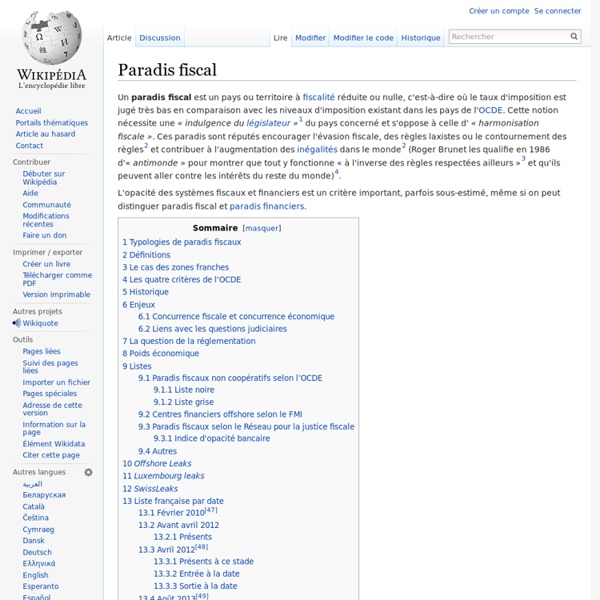isr_investissement_socialement_responsable,transparence,la_suisse_iles_caiman_et_luxembourg_classes_comme_plus_opaques_par_tax_justice_network,135537
La Suisse occupe la première place, avant même les îles Cayman et le Luxembourg. Tel est le « palmarès » du « Financial Secrecy Index », établi par Tax Justice Network (Réseau international pour la Justice Fiscale) pour la seconde fois, la première publication datant de 2009. Les Etats-Unis sont également en « bonne position » (5ème rang, juste après Hong Kong), suivis par Singapour. Si par ailleurs la Grande Bretagne n'arrive qu'en 13ème position, « c'est parce que nous avons séparé Londres de ses îles satellites, précise Markus Meinzer analyste pour Tax Justice Network. "Un outil contre le déni"De fait, l'Indice se présente comme un outil qui vise à lutter contre le secret mais aussi contre le déni dont font preuve un grand nombre d'Etats. Le secret bancaire, un moyen parmi d'autres Par ailleurs, TJN cherche à démonter plusieurs idées reçues en matière de secret bancaire.
Paradis fiscal
Un article de Wikipédia, l'encyclopédie libre. Un paradis fiscal est un pays ou territoire à fiscalité réduite ou nulle, c'est-à-dire où le taux d'imposition est jugé très bas en comparaison avec les niveaux d'imposition existant dans les pays de l'OCDE. Cette notion nécessite une « indulgence du législateur »[1] du pays concerné et s'oppose à celle d' « harmonisation fiscale ». Ces paradis sont réputés encourager l'évasion fiscale, des règles laxistes ou le contournement des règles[2] et contribuer à l'augmentation des inégalités dans le monde[2] (Roger Brunet les qualifie en 1986 d'« antimonde » pour montrer que tout y fonctionne « à l'inverse des règles respectées ailleurs »[3] et qu'ils peuvent aller contre les intérêts du reste du monde)[4]. L'opacité des systèmes fiscaux et financiers est un critère important, parfois sous-estimé, même si on peut distinguer paradis fiscal et paradis financiers. Typologies de paradis fiscaux[modifier | modifier le code] Gestion d'actifs. En 2012[28] :
Amedia Offshore, création de sociétés offshores; Shelf companies, et comptes bancaires
specialiste de l'embouteillage automatique en prise directe
En 1962, René PERRIER, fondateur de la société PERRIER, créa sa première machine pour la source Arcens : un agitateur mécanique de bouteilles basé sur un système de prise et de rotation de la bouteille par son corps. Initialement conçue pour l'homogénéisation de la limonade en bouteilles, cette machine répondait aussi parfaitement aux besoins des maisons champenoises, qui lui ont immédiatement réservé un excellent accueil. Ce succès explique qu'aujourd'hui encore le Champagne reste une des spécialités, un des vecteurs de développement et un des principaux marchés de la société. PERRIER est devenue, à partir de 1968, la référence dans les machines pour le nettoyage de contenants, de 1000 à 120 000 Bph. PERRIER, aujourd'hui dirigée par Monsieur Philippe PERRIER, anticipe chacun des progrès de l'industrie de l'embouteillage. Parc machines : 3500 installations Présence sur les 5 continents Effectif actuel : 150 collaborateurs
Clearstream
Un article de Wikipédia, l'encyclopédie libre. Clearstream Logo de Clearstream Depuis 2001, elle est au centre d'une affaire financière, industrielle et internationale, l'affaire Clearstream 1, et en 2006, au cœur d'une affaire politico-financière, l'affaire Clearstream 2. Description[modifier | modifier le code] Historique[modifier | modifier le code] Clearstream a été créé en 1971 sous le nom de CEDEL. Les clients de Clearstream qui sont des banques ou des institutions financières et quelques entreprises (4 en 2006), ouvrent un compte en Clearstream par lequel seront réglées/livrées leurs transactions avec leur contrepartie elle-même banque ou institution financière. En janvier 2000, elle est devenue Clearstream par la fusion de Cedel International et Deutsche Börse Clearing, une filiale de Deutsche Börse Group, propriétaire de la bourse de Francfort qui en détient 50 %. Affaires judiciaires[modifier | modifier le code] Clearstream 1[modifier | modifier le code]



